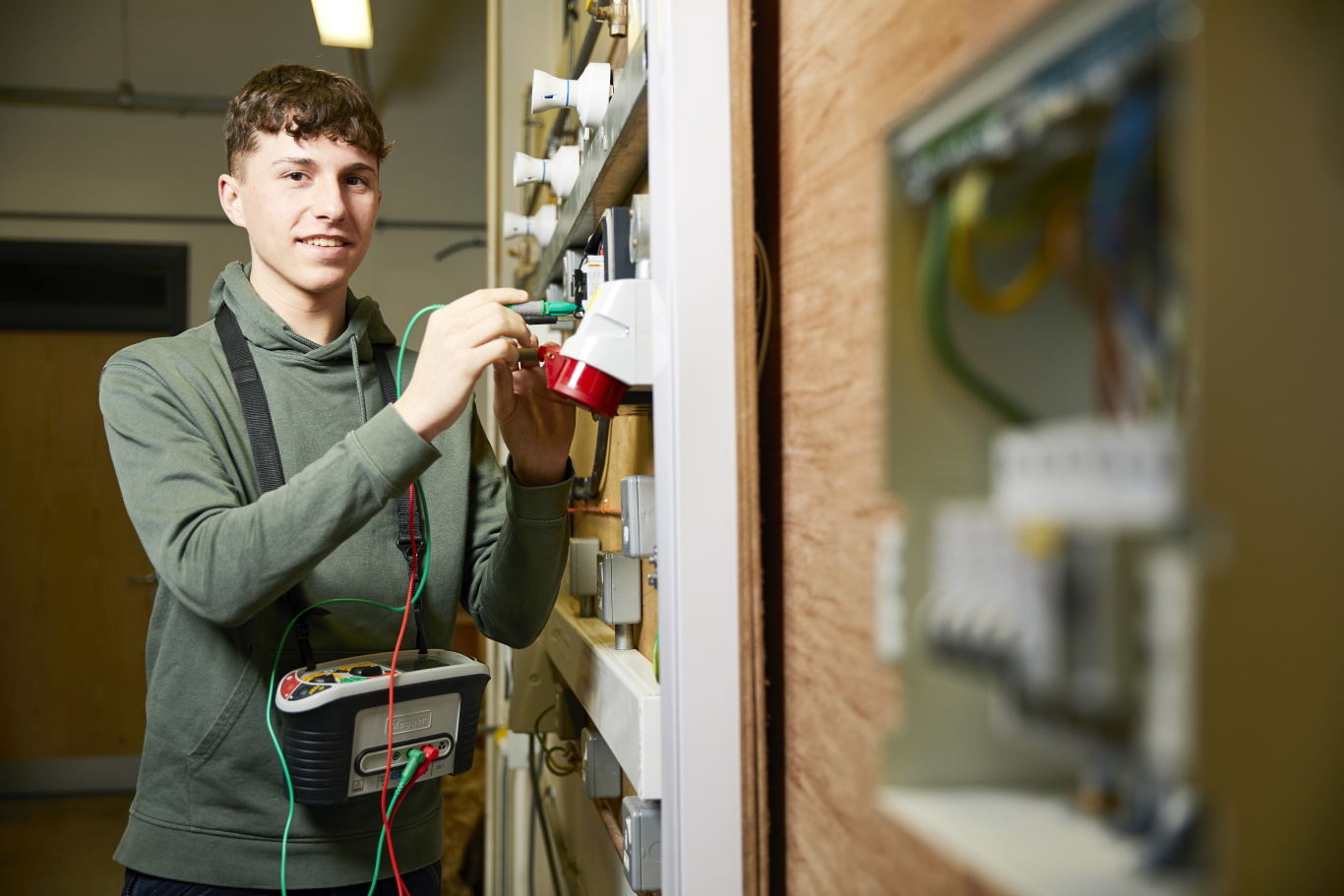
Course may be subject to change.
Unlock advanced skills in our electrical installation workshops using industry standard tools and equipment.
This technical electrician qualification focuses on the development of knowledge and practical skills needed for working in the electrotechnical industry.
On completion of the apprenticeship, you will be recognised by the industry as competent as an installation or maintenance electrician.
Your tutors have vast industry experience and will support you to ensure you gain the hands-on experience and theoretical knowledge employers are looking for, and you need to become an electrician.
Entry Criteria
You will hold GCSE maths, English grade 4 or above, to be eligible for the course
If you are 19 years old+ you may be able to access the course with two years of industry experience.
What are the next steps?
You will be invited to attend an interview. Please bring evidence of relevant qualifications.
Study Aims
This apprenticeship programme is perfect if you wish to work as an electrician in the building services industry.
It has been designed to provide you with a high level of skill, and the ability to progress through further learning or secure a job in the industry.
Modules Studied
City & Guilds Level 3 Electrotechnical Qualification Unit title Assessment Method:
Unit 101 Understand Health, Safety and Environmental Considerations Unit 102 Apply Health, Safety and Environmental Considerations Unit 103 Electrical Scientific Principles and Technologies Unit 104 Understand Design and Installation Practices and Procedures Unit 105 Understand how to Plan and Oversee Unit 106 Organise and Oversee the Electrical Unit 107 Understand Terminations and Connections of Conductors Unit 118 Termination and Connection of Conductors Unit 113 Inspect, Test and Commission Electrical Systems Unit 114 Understand Fault Diagnosis and Rectification Unit 115 Apply Fault Diagnosis and Rectification Portfolio 10 Unit 022 Understand the Requirements for Electrical Installations BS 7671:2018 (2022) Unit109 Apply Design and Installation Practices and Procedures Unit 110 Apply Practices and Procedures for Maintenance
Times of Delivery
1st year apprentices will be in college Wednesday 9.00-4.000pm 2nd year apprentices will be in college Tuesday 9.00-4.00pm. 3rd year apprentices will be in college Monday 9.00-4.00pm. 4th year apprentices will have scheduled appointments on Friday am to finalise portfolio and prepare for AM2s end point assessment.)
Any times indicated are based on current courses and may be subject to change in future years. Full timetables will be confirmed at the start of each course.
Teaching and Assessment
The qualification is assessed through a variety of assessment methods. The knowledge units include: online tests written paper projects or assignments practical observations
These units will be assessed at the candidate’s training provider and centres should refer to assessor guidance for rules on test conditions. The performance units will be evidenced through a workplace evidence record which will form part of the candidates’ portfolio. The performance units should be assessed through naturally occurring opportunities whilst in the workplace. The workplace evidence record allows candidates to demonstrate the practical skills and associated knowledge required of an electrical apprentice.
Learners must: successfully complete all assessments for each mandatory unit successfully complete all assessments for the chosen specialist unit
End Point Assessment
The final assessment for the qualification is an End Point Assessment (EPA) which must be passed to achieve the full qualification.
This handbook contains all the assessment information needed to pass all the units within this qualification. However, for the learner to achieve the apprenticeship in England or Northern Ireland, they also need to successfully complete the AM2S synoptic competence- based assessment. No assessment in this qualification will contribute to the overall grade of the apprenticeship in England or Northern Ireland which is determined solely by the AM2S.
The AM2S is a robust, timed (16.5 hours typically over 2 and a half days) practical and theory (40 multiple-choice questions) assessment in sections, requiring learners to perform a set of common tasks and procedures that a full scope electrical operative might face when working in commercial or industrial premises as well as dwellings. It assesses learners on installation, inspection and testing and fault-finding; their work must comply with BS 7671, be in line with relevant health and safety legislation and conform to current industry practices and procedures.
The AM2S will be graded pass/merit/distinction and weighting of practical to theory of 70% / 30%.
Industry Links
The Institution of Engineering and Technology (IET) is one of the world’s largest Engineering institutions with over 167,000 members in 127 countries.
As the leading institution within the Electrotechnical sector, the IET supports this qualification for young people to progress into the Electrotechnical industry.
The IET has worked with City & Guilds as part of its development process to scope out the qualification.
The IET is satisfied that the content meets both the Institution’s needs as a leading professional body in this sector and those of the people taking it who are preparing for a career within the industry.
On successful completion of this qualification, learners can progress on to City & Guilds Level 4 Award in the Design and Verification of Electrical Installations.
The Electrotechnical qualification will also enable learners to progress within employment
You could progress to study HNC Electrical/Electronic engineering at New College Durham.


